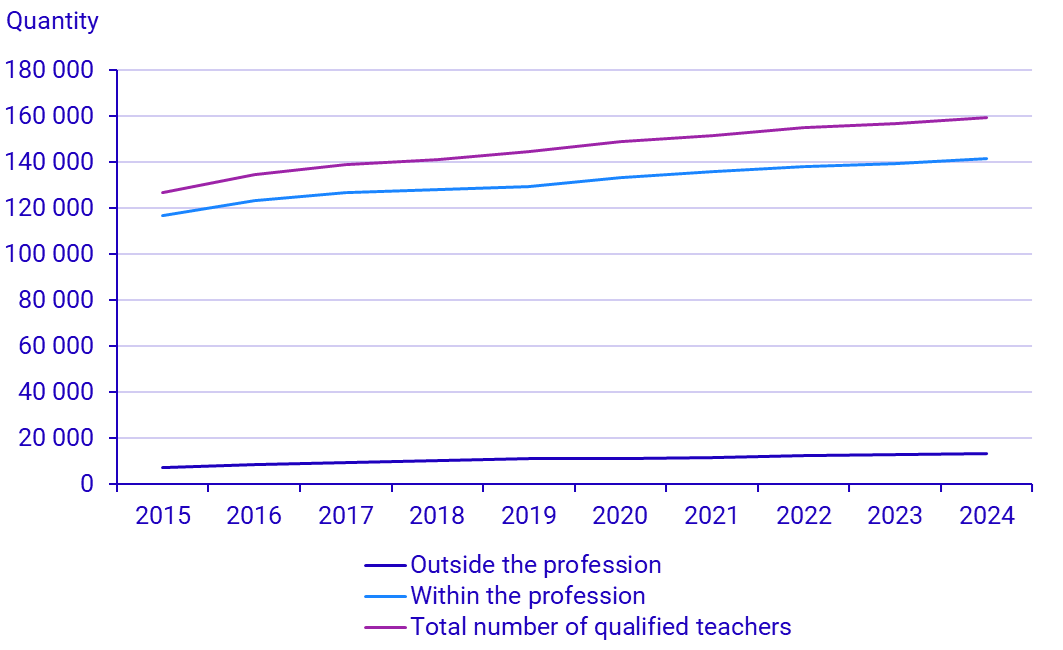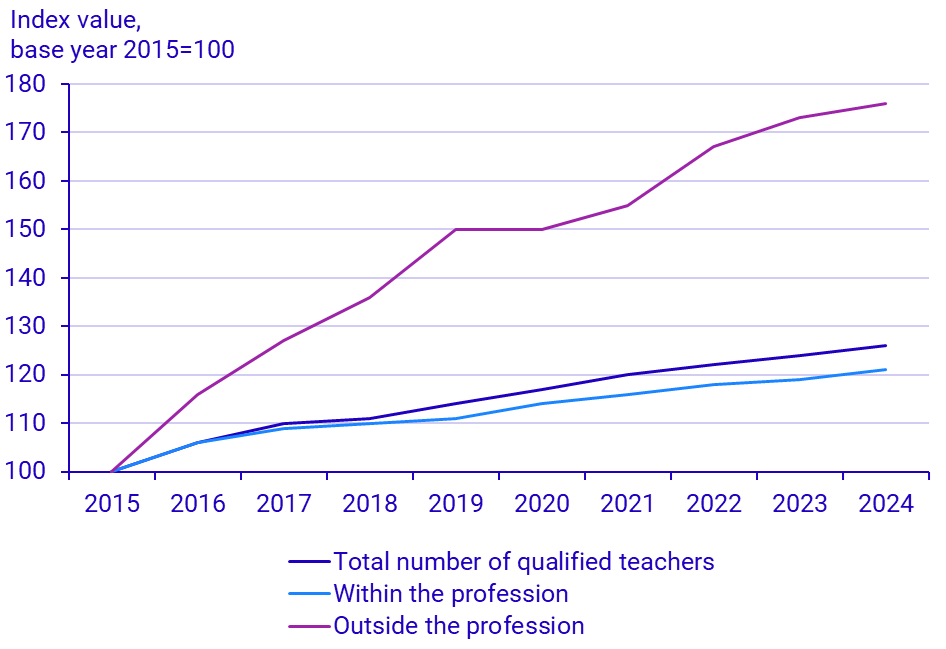Teachers occupation 2025
More qualified teachers but a decreased proportion within the school
Statistical news from Statistics Sweden 2025-04-09 8.00
In 2024 the total number of qualified teachers is approximately 160 000. This represents a 25 per cent increase over the past ten years. During the same period, the number of teachers within schools has also increased, but to a slightly lesser extent. At the same time, the number of teachers leaving the profession has continued to rise.
In 2022, Statistics Sweden reported statistics on teachers' occupation for the first time. The statistics showed that the proportion of qualified teachers increased over time, but at the same time the proportion leaving the profession also increased. The pattern remains: over the past ten years, the number of qualified teachers has increased, while the number of those who actively choosing to leave the profession has also continued to rise.
Analyst Jessica Baldgrim from Statistics Sweden explains:
”Over time, the trend shows a gradual decrease in the proportion of teachers who remain in the profession. The gap between the total number of qualified teachers and those working in schools has widened. At the same time, the number of teachers outside the profession has also risen”
Qualified teachers by total, within or outside the profession 2015–2024

Decline of qualified teachers in the profession
The number of qualified teachers continues to rise, but despite an increase in the number being educated, this has not led to a corresponding rise in the number of teachers remaining in the profession. The figure below shows the development of qualified teachers over time, with 2015 as the reference year. The trend indicates a gradual increase in the number of qualified teachers, while at the same time, a growing number are leaving the profession. As a result, the proportion of qualified teachers in the profession is declining over time, despite the overall increase in the total number of teachers. The increase in teachers voluntarily leaving the profession cannot be explained by retirements.
Jessica Baldgrim clarifies:
”It is important to note that qualified teachers outside the profession represent a much smaller group. What the figure and the indexation show is that the growth rate of teachers leaving their profession is higher than that of the other two groups. While factors as working environment and working conditions may influence the decision to leave the profession, additional factors must be considered to fully explain the increase in teachers leavning.”
Educated teachers by total, within or outside the profession, 2015-2024

The survey” Teachers outside the profession”
In 2016 and 2022, Statistics Sweden conducted a survey of teachers who had left the profession - ‘Teachers outside the profession’. They were asked why they left and what would make them return. The work environment was the main reason in both 2016 and 2022, but stress, workload and overtime were also important factors. For more information, please visit www.scb.se/uf0551
Definitions and explanations
The statistics include certified teachers up to 65 years of age who have worked as a teacher for at least one year during the last 10-year period. The 2014 employment statistics include certified teachers who have worked as a teacher for at least one year between 2004 and 2013.
The requirement for teachers to be certified was introduced in December 2014, and from 1 July 2015 it was fully applicable. In the first two years, there is a backlog of data on licences, leading to an underestimation of the number of licensed teachers. Caution should be exercised when comparing the first two years.
Terminology used in the statistics:
Other occupations within the school refers to people who work as, for example, special educators, teacher assistants, advisors or have another pedagogical role within the school but not as a principal or teacher.
Outside the school refers to people who are not in the school system, i.e., do not work in primary or secondary schools, municipal adult education or the mentioned forms but for pupils with intellectual disabilities.
Not employed refers to students, parental leave and the unemployed. These are the people who are not found within the school in any role or outside the school.
Statistical Database
More information is available in the Statistical Database
Feel free to use the facts from this statistical news but remember to state Source: Statistics Sweden.
